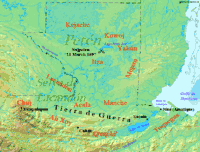شعب الكيخاتشي
شعب الكيخاتشي (بالإنجليزية: Kejache)، وأحيانًا تُلفظ كياتشي أو كيخاتشي أو كياتش أو كيخاتش، كان مجموعة بشرية من شعب المايا، سكنت جنوب شبه جزيرة يوكاتان في القرن السابع عشر.[1] كانت تقع أراضي شعب الكيخاتشي في حوض بيتين في منطقة تقع بين جواتيمالا والمكسيك. تُشير الدلائل اللغوية إلى اشتراك شعب الكيخاتشي في أصوله مع شعب الإيتزا، المُجاور لها إلى الجنوب الشرقي، وأن يكون الكيخاتشي قد احتل المنطقة منذ الفترة الكلاسيكية (250-900 قبل الميلاد). تم التواصل مع شعب الكيخاتشي على أيدي المُستكشف الإسباني إرنان كورتيس عام 1525؛ ثم بعد ذلك، استمر التواصل لاحقًا مع الإسبان، الذين قاموا بافتتاح طريق في الجنوب باتجاه بحيرة بيتين إيتزا.

انظر أيضًا
مصادر
- Jones 2000, p. 353
مراجع
* Bracamonte & Sosa, Pedro (2001). La conquista inconclusa de Yucatán: los mayas de las montañas, 1560–1680 (in Spanish). Mexico City, Mexico: Centro de Investogaciones y Estudios Superiores en Antropología Social, Universidad de Quintana Roo. ISBN 970-701-159-9. OCLC 49519206.
- Chávez Gómez, José Manuel A. (2006). "La Recreación del Antiguo Espacio Político. Un Cuchcabal Kejache y el Na'al Kejach Chan en el siglo XVII". Nuevas Perspectivas Sobre la Geografía Política de los Mayas. Mexico City, Mexico: Universidad Nacional Autónoma de México, Universidad Autónoma de Campeche and the Foundation for the Advancement of Mesoamerican Studies, Inc (FAMSI). pp. 57–80. ISBN 970-32-3208-6. OCLC 69676215. Retrieved 2013-01-25. (Spanish)
- Hofling, Charles Andrew (2009). "The Linguistic Context of the Kowoj". In Prudence M. Rice; Don S. Rice. The Kowoj: identity, migration, and geopolitics in late postclassic Petén, Guatemala. Boulder, Colorado, US: University Press of Colorado. pp. 71–79. ISBN 978-0-87081-930-8. OCLC 225875268.
- Jones, Grant D. (1998). The Conquest of the Last Maya Kingdom. Stanford, California, USA: Stanford University Press. ISBN 9780804735223.
- Jones, Grant D. (2000). "The Lowland Maya, from the Conquest to the Present". In Richard E.W. Adams; Murdo J. Macleod. The Cambridge History of the Native Peoples of the Americas, Vol. II: Mesoamerica, part 2. Cambridge, UK: Cambridge University Press. pp. 346–391. ISBN 0-521-65204-9. OCLC 33359444.
- Rice, Prudence M. (2009). "Who were the Kowoj?". In Prudence M. Rice; Don S. Rice. The Kowoj: identity, migration, and geopolitics in late postclassic Petén, Guatemala. Boulder, Colorado, US: University Press of Colorado. pp. 17–19. ISBN 978-0-87081-930-8. OCLC 225875268.
- Rice, Prudence M.; Don S. Rice (2005). "Sixteenth- and Seventeenth-Century Maya Political Geography". In Susan Kepecs; Rani T. Alexander. The Postclassic to Spanish-Era Transition in Mesoamerica: Archaeological Perspectives. Albuquerque, New Mexico, USA: University of New Mexico Press. ISBN 9780826337399. OCLC 60550555. External link in |chapter= (help)
- Rice, Prudence M.; Don S. Rice (2009). "Introduction to the Kowoj and their Petén Neighbors". In Prudence M. Rice; Don S. Rice. The Kowoj: identity, migration, and geopolitics in late postclassic Petén, Guatemala. Boulder, Colorado, US: University Press of Colorado. pp. 3–15. ISBN 978-0-87081-930-8. OCLC 225875268.
- Rice, Prudence M.; Don S. Rice; Timothy W. Pugh; Rómulo Sánchez Polo (2009). "Defensive architecture and the context of warfare at Zacpetén". In Prudence M. Rice; Don S. Rice. The Kowoj: identity, migration, and geopolitics in late postclassic Petén, Guatemala. Boulder, Colorado, US: University Press of Colorado. pp. 123–140. ISBN 978-0-87081-930-8. OCLC 225875268.
- Schwartz, Norman B. (1990). Forest Society: A Social History of Petén, Guatemala. Ethnohistory. Philadelphia, Pennsylvania, USA: University of Pennsylvania Press. ISBN 9780812213164. OCLC 21974298.
- Villa Rojas, Alfonso (1985). "Los Quejaches: Tribu Olvidada del Antiguo Yucatán". Estudios Etnológicos: Los Mayas. Serie Antropológica. 38. Mexico City, Mexico: Universidad Nacional Autónoma de México. pp. 447–462. ISBN 9789688375655. OCLC 15544002. Retrieved 2013-01-29. (Spanish)
- بوابة غواتيمالا
This article is issued from Wikipedia. The text is licensed under Creative Commons - Attribution - Sharealike. Additional terms may apply for the media files.